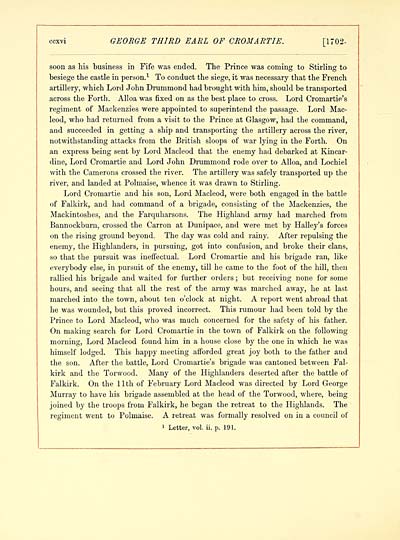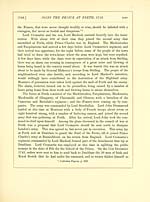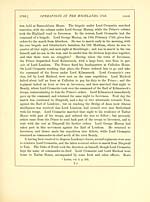Earls of Cromartie > [NSLBLANK]
(284)
Download files
Complete book:
Individual page:
Thumbnail gallery: Grid view | List view

ccxvi GEORGE THIRD EARL OF CROMARTIE. [1702-
soon as his business in Fife was ended. The Prince was coming to Stirling to
besiege the castle in person. 1 To conduct the siege, it was necessary that the French
artillery, which Lord John Drummond had brought with him, should be transported
across the Forth. Alloa was fixed on as the best place to cross. Lord Cromartie's
regiment of Mackenzies were appointed to superintend the passage. Lord Mac-
leod, who had returned from a visit to the Prince at Glasgow, had the command,
and succeeded in getting a ship and transporting the artillery across the river,
notwithstanding attacks from the British sloops of war lying in the Forth. On
an express being sent by Lord Macleod that the enemy had debarked at Kincar-
dine, Lord Cromartie and Lord John Drummond rode over to Alloa, and Lochiel
with the Camerons crossed the river. The artillery was safely transported up the
river, and landed at Polmaise, whence it was drawn to Stirling.
Lord Cromartie and his son, Lord Macleod, were both engaged in the battle
of Falkirk, and had command of a brigade, consisting of the Mackenzies, the
Mackintoshes, and the Farquharsons. The Highland army had marched from
Bannockburn, crossed the Carron at Dunipace, and were met by Halley's forces
on the rising ground beyond. The day was cold and rainy. After repulsing the
enemy, the Highlanders, in pursuing, got into confusion, and broke their clans,
so that the pursuit was ineffectual. Lord Cromartie and his brigade ran, like
everybody else, in pursuit of the enemy, till he came to the foot of the hill, then
rallied his brigade and waited for further orders ; but receiving none for some
hours, and seeing that all the rest of the army was marched away, he at last
marched into the town, about ten o'clock at night. A report went abroad that
he was wounded, but this proved incorrect. This rumour had been told by the
Prince to Lord Macleod, who was much concerned for the safety of his father.
On making search for Lord Cromartie in the town of Falkirk on the following
morning, Lord Macleod found him in a house close by the one in which he was
himself lodged. This happy meeting afforded great joy both to the father and
the son. After the battle, Lord Cromartie's brigade was cantoned between Fal-
kirk and the Torwood. Many of the Highlanders deserted after the battle of
Falkirk. On the 11th of February Lord Macleod was directed by Lord George
Murray to have his brigade assembled at the head of the Torwood, where, being
joined by the troops from Falkirk, he began the retreat to the Highlands. The
regiment went to Polmaise. A retreat was formally resolved on in a council of
1 Letter, vol. ii. p. 191.
soon as his business in Fife was ended. The Prince was coming to Stirling to
besiege the castle in person. 1 To conduct the siege, it was necessary that the French
artillery, which Lord John Drummond had brought with him, should be transported
across the Forth. Alloa was fixed on as the best place to cross. Lord Cromartie's
regiment of Mackenzies were appointed to superintend the passage. Lord Mac-
leod, who had returned from a visit to the Prince at Glasgow, had the command,
and succeeded in getting a ship and transporting the artillery across the river,
notwithstanding attacks from the British sloops of war lying in the Forth. On
an express being sent by Lord Macleod that the enemy had debarked at Kincar-
dine, Lord Cromartie and Lord John Drummond rode over to Alloa, and Lochiel
with the Camerons crossed the river. The artillery was safely transported up the
river, and landed at Polmaise, whence it was drawn to Stirling.
Lord Cromartie and his son, Lord Macleod, were both engaged in the battle
of Falkirk, and had command of a brigade, consisting of the Mackenzies, the
Mackintoshes, and the Farquharsons. The Highland army had marched from
Bannockburn, crossed the Carron at Dunipace, and were met by Halley's forces
on the rising ground beyond. The day was cold and rainy. After repulsing the
enemy, the Highlanders, in pursuing, got into confusion, and broke their clans,
so that the pursuit was ineffectual. Lord Cromartie and his brigade ran, like
everybody else, in pursuit of the enemy, till he came to the foot of the hill, then
rallied his brigade and waited for further orders ; but receiving none for some
hours, and seeing that all the rest of the army was marched away, he at last
marched into the town, about ten o'clock at night. A report went abroad that
he was wounded, but this proved incorrect. This rumour had been told by the
Prince to Lord Macleod, who was much concerned for the safety of his father.
On making search for Lord Cromartie in the town of Falkirk on the following
morning, Lord Macleod found him in a house close by the one in which he was
himself lodged. This happy meeting afforded great joy both to the father and
the son. After the battle, Lord Cromartie's brigade was cantoned between Fal-
kirk and the Torwood. Many of the Highlanders deserted after the battle of
Falkirk. On the 11th of February Lord Macleod was directed by Lord George
Murray to have his brigade assembled at the head of the Torwood, where, being
joined by the troops from Falkirk, he began the retreat to the Highlands. The
regiment went to Polmaise. A retreat was formally resolved on in a council of
1 Letter, vol. ii. p. 191.
Set display mode to:
![]() Universal Viewer |
Universal Viewer | ![]() Mirador |
Large image | Transcription
Mirador |
Large image | Transcription
Images and transcriptions on this page, including medium image downloads, may be used under the Creative Commons Attribution 4.0 International Licence unless otherwise stated. ![]()
| Histories of Scottish families > Earls of Cromartie > [NSLBLANK] > (284) |
|---|
| Permanent URL | https://digital.nls.uk/96760700 |
|---|
| Attribution and copyright: |
|
|---|---|
| Description | A selection of almost 400 printed items relating to the history of Scottish families, mostly dating from the 19th and early 20th centuries. Includes memoirs, genealogies and clan histories, with a few produced by emigrant families. The earliest family history goes back to AD 916. |
|---|

